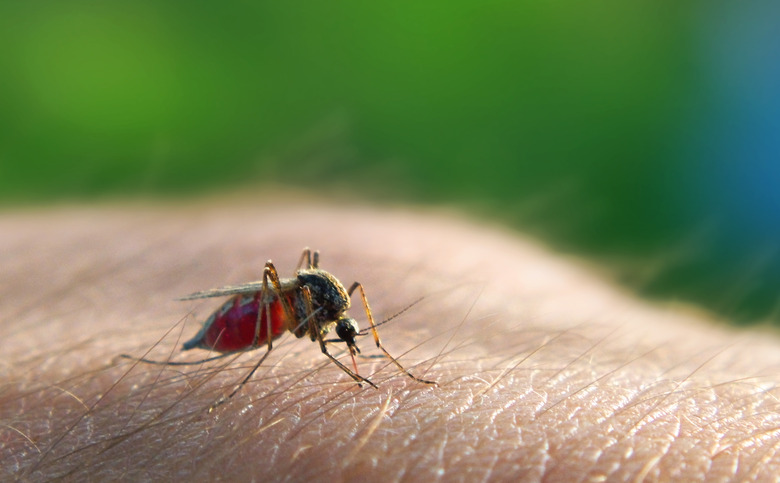How To Avoid The Creepy Crawlies Of Summer
Nothing spoils a summer day like a hum of annoying ZZZZZs in your ear (and a million itchy and swollen bug bites later). Unfortunately for us, "sun's out, fun's out" also applies to insects, and you're bound to uncover at least one obnoxious creepy crawly this summer.
Don't let them, uh, bug you though. Most nasty insects can be repelled, and understanding how they behave can help you avoid them. Read on to learn how to stave off four of the nastiest bugs you're likely to encounter this summer, so you can keep yourself sting-free and safe.
Buzz Off, Mosquitoes
Buzz Off, Mosquitoes
Mosquitoes are the bane of our summer existence, and they can be seriously harmful as well. Because mosquitos come in contact with your blood, they can carry blood-borne diseases, including the virus that causes West Nile fever. That makes avoiding mosquitos especially important if you're in a region near a West Nile outbreak, like Sacramento, Chicago or Southeastern North Carolina.
Mosquitoes also cause irritation with their bites. That's because they don't just suck your blood, they inject a venom that keeps your blood from clotting. The venom triggers your immune system, leading to that characteristic swelling.
The best way to keep mosquitoes away is via an EPA-registered insect repellent, the CDC advises. If you want to steer clear of DEET, try one made with oil of lemon eucalyptus. Some of the top-rated bug repellants, according to Consumer Reports, include Ben's Insect Repellant, Sawyer Insect Repellant, and Repel Lemon Eucalyptus. Spray 'em on, then enjoy your camping trip!
Bye Bye, Biting Flies
Bye Bye, Biting Flies
Mosquitoes might be annoying, but biting flies – especially horseflies, also called gadflies – can really take a chunk out of you. That's because the fly's mouth is made up of saw-like jaws that actually cut and tear into your flesh so they can drink your blood.
While only the female flies drink blood – females need the protein to produce eggs, while males harmlessly feed on nectar – just one fly is enough to put a damper on your beach day.
Like mosquitoes, flies hate the smell of eucalyptus oil, so you might have some success with a homemade eucalyptus essential oil spray. But if you're dealing with flies at home, your best bet is to use a soda bottle to make a horsefly trap.
Sting Ya Later, Wasps
Sting Ya Later, Wasps
They'll crash your BBQ and show up unannounced to your picnic. Yup, wasps are the most unwanted guests of the summer. And while solitary wasps benefit the environment – because, like bees, they help pollinate plants and eat other pests – wasps that form colonies can take over your whole backyard.
Their stings are no joke, either. After a sting, the wasp's venom starts to break down cell membranes. That includes the membranes of your nerve cells, which send "pain" signals back to your brain. While the actual damage to your tissues is low (and easily fixable) it means the wasp's sting can feel very painful.
If you've got a wasp nest nearby, it's best to leave handling the nest to your parents or the professionals. If you have a stray wasp at your party, keep still or gently guide it away to avoid getting stung. And keep sweet foods covered up so they don't attract more wasps.
Tah-Tah, Ticks
Tah-Tah, Ticks
A nature hike is a fantastic way to learn more about the world around you and take in the calming effects of the great outdoors. But if you're hiking through forests or fields, you might pick up an unwelcome hitchhiker.
Ticks thrive in wooded, grassy or brushy areas, and could latch onto your or your pet, dig into your skin and stay there to suck your blood. On top of being, well, gross, ticks can also spread diseases, including lyme disease – a bacterial infection that can linger for years.
If you're hiking outside in a tick-prone region, make sure you're wearing an EPA-registered insect repellent. Check yourself (and your pet) thoroughly after each hike, and use these CDC-recommended tips for tick removal. If you have signs of a bite, like a circular target-like rash, see your doctor.
Just a few minutes of prep can save your adventure from getting swarmed by icky bugs – and keep your safe (and bite-free) all summer long.
Cite This Article
MLA
Tremblay, Sylvie. "How To Avoid The Creepy Crawlies Of Summer" sciencing.com, https://www.sciencing.com/how-to-avoid-the-creepy-crawlies-of-summer-13714001/. 20 July 2018.
APA
Tremblay, Sylvie. (2018, July 20). How To Avoid The Creepy Crawlies Of Summer. sciencing.com. Retrieved from https://www.sciencing.com/how-to-avoid-the-creepy-crawlies-of-summer-13714001/
Chicago
Tremblay, Sylvie. How To Avoid The Creepy Crawlies Of Summer last modified March 24, 2022. https://www.sciencing.com/how-to-avoid-the-creepy-crawlies-of-summer-13714001/
